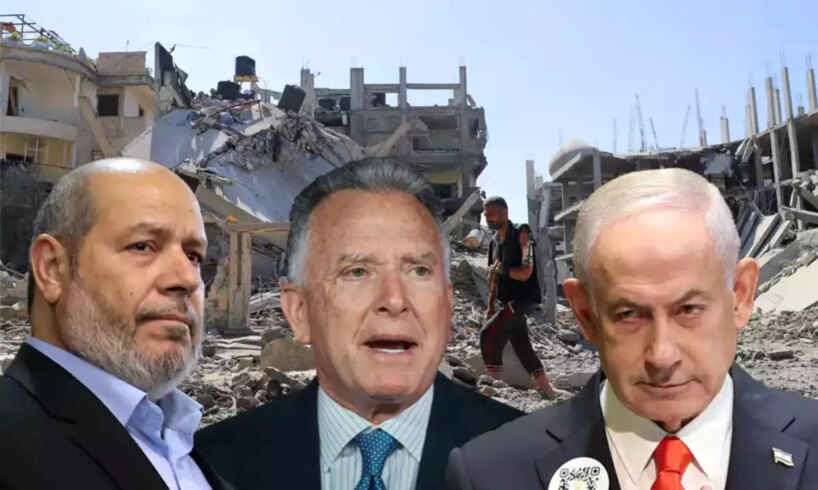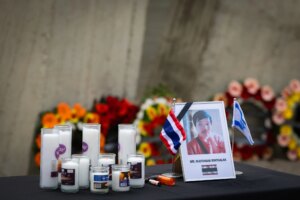
Under heavy American pressure, Israel has approved the entry of a foreign force into Gaza to assist in locating the remaining deceased hostages.
Over the weekend, Israeli officials warned the mediators that Hamas is deliberately delaying the return of the hostages in order to buy time and reestablish its control over the parts of the Gaza Strip still under its rule. According to intelligence shared with Washington, Hamas has direct access to the deceased, between five and eight hostages.
“Hamas could immediately return five bodies and another three very soon,” an Israeli source said, rejecting the group’s claim that it needs heavy engineering equipment to locate them. The same source said Hamas is demanding the reopening of the Rafah crossing for the movement of people, as stipulated in the Sharm el-Sheikh agreement, and the entry of heavy machinery to aid both in the searches and in reconstruction efforts.
Egyptian President Abdel-Fattah el-Sissi will send a team into the Gaza Strip. Photo: Reuters
Israel is opposed to reopening Rafah at this stage, viewing the crossing as one of its main bargaining chips. Under the Sharm el-Sheikh agreement, the crossing is to reopen only after Hamas completes the transfer of all the hostages’ remains in its possession. During negotiations, the terrorist organization claimed it does not have access to all of them and requested external help from Egypt and Turkey in locating others. Israel, however, has agreed to such assistance only after Hamas returns all the bodies to which it has direct access.
Turkey, for its part, asked to send both engineering equipment and military personnel to take part in the searches, but Israel views this as an attempt to gain a foothold in Gaza and has made it clear that no Turkish troops will be allowed to enter the Strip for any purpose. The United States accepted Israel’s position, and both Vice President Vance and Secretary of State Rubio stressed that Israel’s consent is required for the composition of any foreign force and for determining the administrative framework for Gaza.
US President Donald Trump and Turkish President Recep Tayyip Erdogan. Israel rejected the entry of a Turkish force into Gaza. Photo: Reuters
Will the Rafah crossing be opened?
If additional hostages are returned in the coming days, Israel may consider a partial reopening of the Rafah crossing. The mediators are pressing Israel, via the Americans, to allow this, arguing that the continued closure is delaying talks on the next phase of the Gaza plan, in which Hamas is expected to disarm and hand over governing authority.
Should the crossing reopen, it will be managed on the Gazan side by local Palestinian officials who previously worked under the Palestinian Authority’s civil networks and whose names have been approved by Israel. European Union personnel, along with the Israel Defense Forces and the Shin Bet security agency, will monitor the crossing through surveillance cameras. Israel will retain authority over all entries and exits to prevent the escape of senior terrorists or the smuggling of weapons and prohibited materials. At present, an IDF force is stationed near the crossing and maintains control of the area.
Humanitarian reconstruction
Meanwhile, in the zones under IDF control, work is accelerating on several humanitarian areas in both southern and northern Gaza. During visits by senior American officials to the international base in Kiryat Gat, Israeli representatives presented plans and progress in building the necessary infrastructure. Bulldozers are leveling large areas to create permanent housing sites for Palestinians, intended to accommodate them until their homes can be rebuilt.
Infrastructure for electricity, water and sewage is being laid, and foundations have been poured for schools and clinics, the most immediate needs. More than 10 countries are taking part in the project, alongside UN agencies that, unusually, are working in full coordination with Israel. The United Arab Emirates is leading the initiative, with Egypt, Morocco, Jordan, several European nations, Canada and the United States also contributing.
In parallel, Palestinian teams are being trained to operate and manage the schools, clinics, utilities and day-to-day administration. The training is conducted on-site by professionals from the participating countries. While the IDF maintains military control over these areas, civilian order is being handled by Palestinian groups, some of which have received Israeli support, until the arrival of the planned multinational force.





